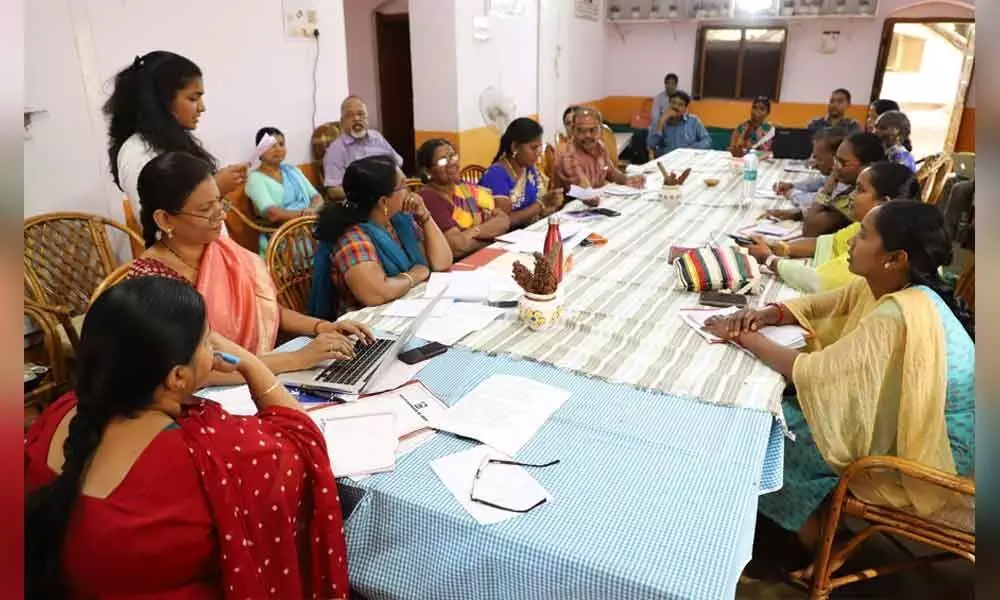Live
- Man held for siphoning Rs 8.14 cr in trading scam
- Don’t pressurise students for fees
- Almonds are a key to faster muscle recovery after exercise: Study
- No govt faced so much criticism than Revanth-led Cong in 11 months: Kavitha
- Balineni signed SECI agreement, says Chevireddy
- Infant kidnapped from Niloufer Hospital rescued, cops arrest 3
- Sunny Leone reflects on challenges and preparations for ‘Shero’
- Hyderabad Saree Festival 2024 kicks off in a grand manner
- Speed up Veligonda project works, CPM urges govt
- 10 career opportunities with a public policy degree
Just In
Sangareddy: Millet rights are women's rights, stress Millet Sisters


“All millets are poised for a revolution” in the words of Prime Minister of India. Taking an initiative forward, the Millet Sisters Network of India met in Pastapur village in Zaheerabad mandal in Sangareddy district from January 27 to 29.
Pestapur: "All millets are poised for a revolution" in the words of Prime Minister of India. Taking an initiative forward, the Millet Sisters Network of India met in Pastapur village in Zaheerabad mandal in Sangareddy district from January 27 to 29. It declared that 'Millet Rights are Women's Rights' and demanded a better deal for millets and issues surrounding them
A Millet Charter 2020 was released at the end of the three-day conference of All India Millet Sisters (AIMS). They explained that Millets represented the closest expression of women rights in food and farming since they embodied all the politics and concerns of global women's movements. Millets with their extraordinary capacity to withstand the climate change pressure may be the only grains that can be tapped for public food systems. Therefore there is an immediate need to recognise 'Millets as Foods of Future' for India and all food planning must be based on millets, the meet stressed.
Referring to the Prime Minister's recognition of Millets as Treasure of nutrition and commending for a call to start a millet revolution in India the Millet siters demanded that these thoughts can be translated into action only if state policies such as Kisan Samman Yojana focus on millets. While the other farmers would get Rs 6,000 per year under Kissan Samman Yojana, millet farmers should get Rs 10,000 per acre per year if the PM's noble thoughts are to be translated into noble action. In the context of India's miserable standing of 185th position in the malnutritioned nations in the world, the AIMS demanded the transition of the nomenclature course cereals into nutritional cereals.
The argument that 'Millet rights are women's rights' flows from the guidelines of International Committee on Food security, the millet charter stated. Noting that the guidelines had identified food supply chains which determine the availability of a safe and nutritious food, actions to be taken to ensure the accessibility of sustainable healthy diets, the notion that people are central to nutritional knowledge and education and women's empowerment in food systems.
The millet sisters also noted with concern that in the current atmosphere of millet mania the essential soul of millet farming namely biodiversity had become the first victim. In view of this they strongly reaffirm that biodiversity was the soul of millet farming and hence it should be treated as the first principle.
In view of the fact, the charter said, that women farmers were the true preservers of authentic biodiverse millet farming. All the agricultural finance institutions must move away from their tradition of preferring non-food crops such as cotton and heavily irrigation dependent crops such as rice, sugarcane etc. in preference over millets. They should accord higher preference to millet crops in the light of the new evidences starting with climate change.
The Millet sisters vowed to take up an all India campaign for the implementation of the promise of putting millets in the Public Distributive Systems, a promise that was enshrined in the Food Security Act of India passed by parliament in 2013, informed PV Satheesh, Director, Deccan Development Society and National Convenor of Millet Network of India.

© 2024 Hyderabad Media House Limited/The Hans India. All rights reserved. Powered by hocalwire.com






